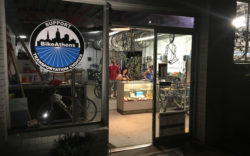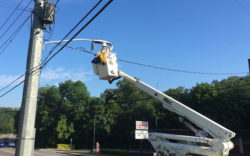Recently a rumor circulated around local social media that glass would no longer be accepted in curbside single-stream recycling. Joe Dunlop, commercial recycling specialist in the ACC Solid Waste Recycling Division, cleared it up: “Republic Services does blanket marketing and unfortunately put a note in the bills of their Athens customers indicating they no longer accept glass at the curb. This note was meant for their Atlanta market customers.” Avid Athens recyclers were relieved, but why aren’t they recycling glass in Atlanta?
I asked Suki Janssen, director of ACC Solid Waste, to rank the most abundant materials that they find in the recycling stream in order of value. Of the eight that she named, aluminum cans and No. 2 plastic have the highest value, followed by No. 1 plastic, cardboard, steel and mixed paper. Glass is just above trash contamination at the bottom of the list. Glass can damage more valuable recyclable commodities when mixed together, it requires expensive optical sorting equipment, and it is difficult and energy intensive to recycle into new products. Glass that leaves our local sorting facility isn’t recycled, it’s downcycled: It is sent to an Atlanta company that sells it as road or drainage base. So while we’re keeping it out of our landfill it is currently handled at a loss, and it may wind up in the ground anyway.
It turns out that glass isn’t the only problem in what is now called a “recycling recession.” According to Janssen, “A perfect storm of many factors has created challenges never seen before in the recycling industry. Factors include the lowest crude oil prices in 12 years, strength of the U.S. dollar compared to the Chinese yuan, China’s Green Fence, increase of non-recyclable flexible packaging replacing recyclable containers and increased contamination.” These and other factors contribute to higher processing costs and lower revenues to the tune of a $75,000 loss for ACC Solid Waste. (Side note: While China affects global and local recycling economics, all ACC recyclables are marketed in the U.S. and Canada.)
“We are asking for patience and assistance during this time,” Janssen says. “Particular help is needed with combating contamination—we only want what can be recycled.” A big problem is “wishful recyclers” who put things in the bin that they wish were recycled but aren’t. The three worst things that people put in the recycling bin are film (stretchy) plastics, food or liquid residue in containers and shredded or small pieces of paper. “Quality is better than quantity in the case of recycling,” she says. “We want active, engaged and caring recyclers who understand the recycling rules and follow them. I believe Portland coined the term, ‘When in doubt, throw it out.’ We concur.”
The move to single-stream curbside collection in 2011 both helped and hurt. The collection costs went down but processing costs went up. It engaged more people in the act of recycling by making it easier and raising awareness, but along with that came more opportunity for contamination. Contaminants just wind up on a longer, costlier ride to the landfill, often degrading recyclables or damaging equipment along the way.
Recycling is going through a dark time right now, but you can help keep it viable in Clarke County. Follow the recycling rules and instructions found at athensclarkecounty.com/recycling. Don’t guess or assume; if you’re not sure about an item, you can call 706-613-3512 to get clarification. Residential customers should never bag recyclables, and keep all film plastics out of your recycling bin. Rinse out any food residue and leave out the small bits of paper. Remember that shredded paper and film plastics can go to the CHaRM (Center for Hard to Recycle Materials), and there are many opportunities to compost food scraps in Athens. Educate yourself, schedule a tour of the recycling facility and landfill (seriously), and share correct information with others.
Finally, there is a reason why “recycle” comes last in the phrase, “Reduce, Reuse, Recycle.” You can do much greater good if you reduce your need for disposable products and packaging and, if possible, reuse stuff as much as you can before you dispose of it. But when you finally dispose of it, do it right.
Got a question for the Greensplainer? Email [email protected].
Like what you just read? Support Flagpole by making a donation today. Every dollar you give helps fund our ongoing mission to provide Athens with quality, independent journalism.










